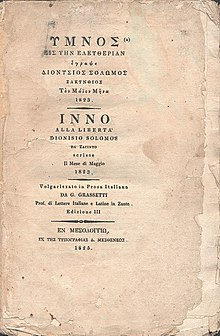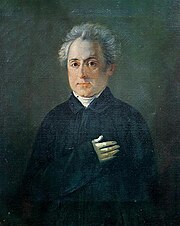Hymn to Liberty
 From Wikipedia - Reading time: 21 min
From Wikipedia - Reading time: 21 min
| English: "Hymn to Liberty" | |
|---|---|
| Ὕμνος εἰς τὴν Ἐλευθερίαν Ὕμνος πρὸς τὴν Ἐλευθερίαν | |
 1825 book cover | |
National anthem of Cyprus and Greece | |
| Lyrics | Dionysios Solomos, 1823 |
| Music | Nikolaos Chalikiopoulos Mantzaros, 1865 |
| Adopted | 1864 (by Greece)[1] 1966 (by Cyprus)[2] |
| Audio sample | |
U.S. Navy Band instrumental version | |
The "Hymn to Liberty",[a] also known as the "Hymn to Freedom",[b] is a Greek poem written by Dionysios Solomos in 1823 and set to music by Nikolaos Mantzaros in 1828. It officially became the national anthem of Greece in 1864 and Cyprus in 1966. Consisting of 158 stanzas in total, is the longest national anthem in the world by length of text.[3]
History
[edit]Dionysios Solomos wrote "Hymn to Liberty" in 1823 in Zakynthos, and one year later it was printed in Messolonghi.[1] In October 1824 it was published in London by the Philhellenic Committee, and an Italian translation was published in the Messolonghi newspaper Ellinika Chronika at about the same time.[1]
It was set to music in 1828 by the Corfiot operatic composer Nikolaos Mantzaros, who composed a choral versions, in 24 parts, and dedicated it to the first King of Greece, Otto.[1] Otto awarded Mantzaros with the Silver Cross of the Order of the Redeemer as a token of appreciation, but during Otto's reign (1832–1862), an anthem based on God Save the King was used, with a text glorifying Otto.[1]
After Otto's ouster in 1862, the "Hymn to Liberty" was adopted as the national and royal anthem of Greece in 1864.[1] The "Hymn to Liberty" was also adopted as the national anthem of Cyprus by order of the Council of Ministers in 1966.[4]
Lyrics
[edit]
Inspired by the Greek War of Independence, Solomos wrote the hymn to honour the struggle of Greeks for independence after centuries of Ottoman rule.[5][6][7]
"Hymn to Liberty" recounts the misery of the Greeks under the Ottomans and their hope for freedom. He describes different events of the War, such as the execution of Patriarch Gregory V of Constantinople, the reaction of the Great Powers, extensively the Siege of Tripolitsa and the Christian character of the struggle.
The following are the first 8 verses of the national anthem of Greece.[8]
| Greek original[1] | Roman Greek | IPA transcription[c] |
|---|---|---|
Σε γνωρίζω από την κόψη |
Se gnorízo apó tin kópsi |
[s̠e̞‿ɣno̞.ˈɾi.z̠o̞‿a̠.ˈpo̞ tiŋ‿ˈɡo̞p̚.s̠i |] |
| Poetic English translation[8][18] (Rudyard Kipling, 1918) |
Literal English translation[19][better source needed] |
|---|---|
We knew thee of old, |
I know you from the blade |
Uses
[edit]An adapted version was used during the short-lived Cretan State as the Cretan Anthem. The "Hymn to Liberty" had been the Greek royal anthem after 1864.
"Hymn to Liberty" has been the national anthem of Cyprus since 1966.[2]
"Hymn to Liberty" has been performed at every closing ceremony of the Olympic Games, to pay tribute to Greece as the birthplace of the Olympic Games. Most renditions performed during the closing ceremonies are instrumental. Until the 2024 Summer Olympics closing ceremony, the Greek anthem was sung for three times during the Sydney, Athens (as Greece was the host country), and Vancouver.
The version commonly played by military bands is an arrangement composed by Lieutenant Colonel Margaritis Kastellis (1907–1979), former director of the Greek Music Corps.[20]
Notes
[edit]- ^ Greek: Ὕμνος εἰς τὴν Ἐλευθερίαν, Hýmnos eis tin Eleftherían, pronounced [ˈimnos is‿tin elefθeˈɾi.an]
- ^ Greek: Ὕμνος πρὸς τὴν Ἐλευθερίαν, Hýmnos pros tin Eleftherían, pronounced [ˈimnos pros‿tin elefθeˈɾi.an]
- ^ See Help:IPA/Greek and Modern Greek phonology.
- ^ Sometimes written κόκαλα,[9] a more modern form.
- ^ Written variously, including as να 'λθη[10] and νάλθη.[11] Έλθει is the modern formal third person singular perfective, also used in subjunctive compounds with να.
- ^ a b Occasionally, the abbreviated variant κι is used.[12][13]
- ^ Also written κλάυματα,[14] κλάηματα[15] and κλάματα.[16][17]
References
[edit]- ^ a b c d e f g Sklavos, G. (1934). "Ἐθνικός ὔμνος" [National anthem]. Μεγάλη Ἐλληνικὴ Ἐγκυκλοπαιδεῖα, Τόμος Δέκατος. Ἑλλάς – Ἑλληνισμὸς (in Greek). Athens: Pyrsos Co. Ltd. pp. 244–247.
- ^ a b "Presidency of the Republic of Cyprus – The National Anthem". Archived from the original on 3 May 2011. Retrieved 14 February 2011.
- ^ "Greece: Hymn to Liberty". NationalAnthems.me. Retrieved 7 April 2017.
- ^ "National Anthem". Archived from the original on 13 August 2011. Retrieved 3 June 2015.
- ^ "Ύμνος εις την Ελευθερίαν". stixoi. Retrieved 8 August 2019.
- ^ "Ύμνος εις την Ελευθερίαν". sansimera. Retrieved 8 August 2019.
- ^ Papaloizos, Theodore (2009). Greek language, Modern. ISBN 978-0-932416-02-5. Retrieved 8 August 2019.
- ^ a b "The National Anthem". Presidency.gr. Retrieved 10 December 2023.
- ^ "Orthodoxy in Modern Greek Poetry". www.myriobiblos.gr. Retrieved 4 January 2022.
- ^ Moleas, Wendy (25 March 2004). The Development of the Greek Language. Bloomsbury Academic. p. 84. ISBN 978-1-85399-675-7.
- ^ Kolias, Nina K. (1997). The Greeks in Alberta, 1903–1995. N.K. Kolias. p. 13. ISBN 978-0-9681616-0-9.
- ^ "Ύμνος εις την Ελευθερίαν". Sansimera.
- ^ "Διονύσιος Σολωμός, "Ο Ύμνος εις την Ελευθερίαν"". ebooks.edu.gr. Retrieved 4 January 2022.
- ^ "Υμνος εις την Ελευθερίαν" (PDF). digital.mmb.org.gr. 1918. Retrieved 4 January 2022.
- ^ Genikē anthologia: poiēseōs & pezographias (in Greek). S.D. Dēmētrakos. 1965. p. 219.
- ^ "Σπουδαστήριο Νέου Ελληνισμού - Σολωμός Διονύσιος - Solomos". www.snhell.gr. Retrieved 30 December 2021.
- ^ "Ύμνος εις την Ελευθερίαν". Stixoi.
- ^ "Poem of the Day: Hymn to Liberty by Rudyard Kipling". HeraldScotland. 30 July 2016. Retrieved 30 December 2021.
- ^ "National Anthems & Patriotic Songs - Greek & Cypriot National Anthem - Ýmnos is tin Eleftherían (long version) lyrics + English translation". lyricstranslate.com. Retrieved 19 January 2023.
- ^ "National Anthem". Hellenic Army Academy. Archived from the original on 9 February 2015. Retrieved 30 January 2015.
External links
[edit]- Ύμνος εις την Ελευθερίαν: Scores at the International Music Score Library Project
- Short 30 min Version Full version Versions of the Hymn at YouTube
- The Greek Presidency – The website for the Presidency of the Hellenic Republic has a page about the National Anthem, including an instrumental file.
- Michał Bzinkowski, Eleuthería ē Thánatos!: The idea of freedom in modern Greek poetry during the war of independence in 19th century. Dionysios Solomos’ “Hymn to Liberty”
- Neugriechische Volksgesänge, Johann Matthias Firmenich
- The Hymn with all 158 stanzas (in Greek & English)
- From the Official Website of the Greek Presidential Guard
- The Greek national Anthem (in mp3)
 KSF
KSF


